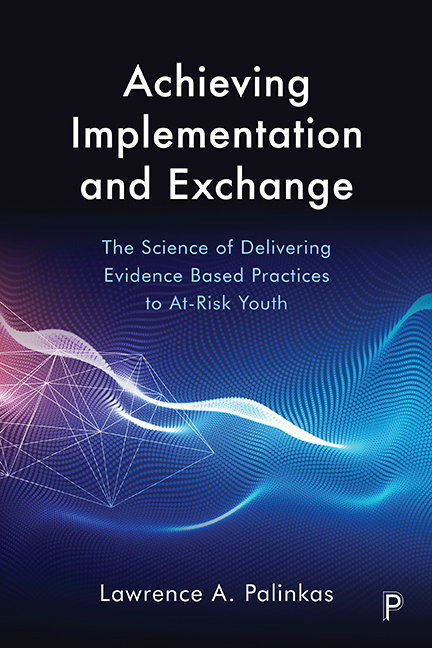 Achieving Implementation and Exchange
Achieving Implementation and Exchange Book contents
- Frontmatter
- Dedication
- Contents
- Tables and figures
- Abbreviations
- Preface
- 1 Introduction
- 2 The need for evidence-based practice
- 3 Understanding and reducing the gap
- 4 EBP implementation in child welfare and child mental health
- 5 Social networks and EBP implementation
- 6 Use of research evidence and EBP implementation
- 7 Local models of EBP implementation
- 8 Research–practice–policy partnerships
- 9 Cultural exchange and EBP implementation
- 10 A transactional model of implementing EBP
- References
- Index
1 - Introduction
Published online by Cambridge University Press: 13 April 2022
- Frontmatter
- Dedication
- Contents
- Tables and figures
- Abbreviations
- Preface
- 1 Introduction
- 2 The need for evidence-based practice
- 3 Understanding and reducing the gap
- 4 EBP implementation in child welfare and child mental health
- 5 Social networks and EBP implementation
- 6 Use of research evidence and EBP implementation
- 7 Local models of EBP implementation
- 8 Research–practice–policy partnerships
- 9 Cultural exchange and EBP implementation
- 10 A transactional model of implementing EBP
- References
- Index
Summary
I think that we have to be careful about using the term evidence-based practice and really defining it in different ways. And I think of the three Ps, I think of evidence-based practices, I think of evidence-based programs, and I think of evidence-based principles. And I think principles are more interchangeable. But, the difference between a program that is a canned program that needs to be done just this way, versus having components of principles that people do. And so, for example, Motivational Interviewing is a skill that can be incorporated into many settings. It doesn't have to be rolled out like a canned curriculum. So, like I said, we need to put that back out to think about evidence-based practices and principles as different things, or programs and principles as different things. And also, I think we need to be clear about what really has evidence behind it and what not, and what the quality of that evidence is. I think that we need to be careful, because I’m afraid everyone is going to say “Oh well, I do evidence-based practice,” but it doesn't look like it when you break it down. That, again, is why I like principles. So, how are the staff delivering it? How are the kids receiving it, you know, or the adults? So, I guess I have a lot of concern about, you know, getting on the bandwagon with this and not being really thoughtful both from the practitioner's side and the researcher's side. (Chief probation officer)
Evidence provided by single studies, systematic reviews, and government statistics suggests that mental health problems affect up to one-quarter of all youths worldwide at any one point in time and about one-third across their lifetimes (Merikangas, 2009). Half of all lifetime cases of mental health problems begin before age 14 and 75 percent by age 24 years (Kessler et al, 2005) if not sooner (Kim-Cohen et al, 2003). These problems include depression, anxiety, traumatic stress, conduct disorders, and substance abuse. Youth involved in child welfare systems are at even higher risk, with as many as 50 percent having behavioral and mental health problems (Burns et al, 2004).
- Type
- Chapter
- Information
- Achieving Implementation and ExchangeThe Science of Delivering Evidence-Based Practices to At-Risk Youth, pp. 1 - 14Publisher: Bristol University PressPrint publication year: 2018


